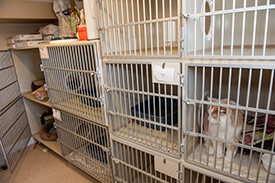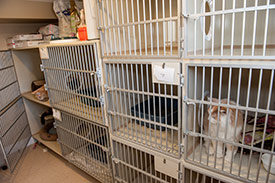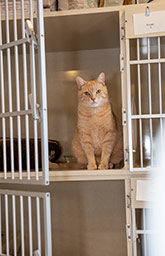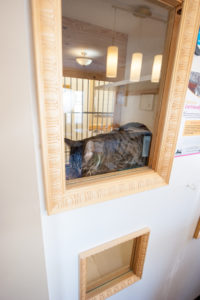It’s a stressful prospect for both you and your cat. You have to be away from home, and need to find care. The Brantford area offers a variety of boarding facility options, but how do you know what to look for?
What to look for in a boarding facility
A boarding facility for cats needs to provide a Cat Friendly, stress-free environment that is also safe, with no risk of contracting infectious disease. Here are some things to consider:
Cat Friendly and Stress Free
- Boarding units should not be facing each other and partitions between units should be opaque. Cats should not be able to see each other, as it is stressful to have strange cats within visual sight. Cats are generally solitary animals and do not like the presence of unfamiliar cats, nor do they understand the concept of partitions being permanent. It will increase their stress level if they think an adjacent cat or a cat at play nearby might be able to eat their food, use their litter and/or use their beds.
- Staff should be providing a minimum of twice daily care to the cat and boarding unit, ensuring messes are cleaned up, food and water bowls are clean and litter boxes are scooped and clean.
- Blankets and beds should be clean, but a full removal of blankets is not recommended as it is important for the unit to retain some of the cat’s scent. The boarding facility should allow you to bring your cat’s own blankets, beds and toys if so desired, as this will improve the comfort level of the cat in a new setting.
- Cats should be allowed exercise time at least once daily, away from and out of visual distance of other cats. If exercise areas face onto other boarders, stress and anxiety will ensue.
Health & Safety Conscious
- Boarding facilities should require up to date vaccinations with certificate proof against the upper respiratory viruses Feline Viral Rhinotracheitis (FHV-1) and Feline Calicivirus (FCV). These infectious viruses can be spread through droplets on air via sneezes.

- Boarding facilities should require up to date vaccinations with certificate proof against Rabies virus.
- Boarding facilities should have a posted infectious disease control policy, with the goal of eliminating any risk of spread of infectious disease from cat to cat.
- Boarding facilities should have a flea prevention treatment requirement. Fleas are very difficult to diagnose on cats, and can travel from unit to unit easily. The most effective way to prevent fleas in a boarding facility is to require application of a licensed veterinary flea control product prior to arrival to the facility.
Deluxe Boarding Room

If your cat is outgoing and curious, this is the boarding place to be. This room offers a few unit sizes, all with several platforms for climbing and perching. All but one of the boarding units in this room offer a view of the reception area, allowing your cat to keep in touch with the comings and goings of the clinic.
One of these units will allow multiple cat households to board their cats together at a discounted fee. Others are designed for only one cat. A cat that is known to be difficult to handle at the veterinary clinic will be boarded in our downstairs private boarding facilities.
For more information, please contact us.
Private Boarding Room

If your cat prefers less activity and a quiet space, the private boarding room is an excellent choice. This boarding room is located in our downstairs facility. This room has a window to outside, allowing lots of natural daylight to flood in.
There are four units that measure 3 feet wide by two feet deep by three feet high. These units can be joined by a porthole, which allows the cat to move freely from one area to the other.
At an owner’s request, and for a small additional fee, an adjoining unit can be reserved and the porthole kept open. There are also 3 double-units consisting of 2 units joined by a porthole.
Each unit measures 2.5 by 2.5 feet by 2.5 feet. Many of our boarding units also have shelves for those cats that prefer to sleep or perch off the main floor of the unit. For more information, please contact us.
What if my cat has a chronic health problem?

Boarding is a service we offer for patients of the Charing Cross Cat Clinic. Cats with chronic illnesses such as diabetes mellitus, kidney insufficiency and other conditions are welcome to board with us.
The veterinarian will review your cat’s medical record to ensure that there are no outstanding care needs. We reserve the right to decline the boarding of any chronically ill cat that is not considered stable enough to handle the stress of boarding, or that has not had regular healthcare follow up.
For more information please contact us by email at helpdesk@charingcrosscatclinic.com or call 519-770-4228.
What if my cat requires medication?
Boarders requiring medication during their stay may be subject to additional medicating fees. These fees cover the additional time and staff required to both administer, store and manage documentation of the medications.